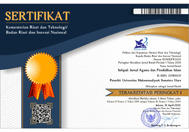The Strategy Of Islamic Counseling Guidance In Efforts To Form The Charakter Of Students At PPTQ Muhammadiyah Atmo Wahjono Sukoharjo
Abstract
The aim of this research is to describe the BKI ustaz's strategy in forming the character of the santri, to find out the dominant character possessed by the santri and the supporting and inhibiting factors in the formation of Islamic character at the Tahfizhul Qur'an Muhammadiyah Atmo Wahjono Islamic Boarding School. Using a qualitative descriptive approach, data was collected through in-depth interviews, observation and documentation involving ustaz, students and Islamic boarding school caregivers. The results of the research show that the character building of santri is carried out in several forms, namely: approaching the ustadz and santri, getting used to the santri's lifestyle, inauguration of IPM, and regular counseling services for santri who need it. The dominant santri characters are: the character of gratitude, the character of faith, and the character of being kind to parents. The supporting factors are: good management performance, good interaction between students and ustadz, guardians of students who support the implementation of the regulations, the presence of Islamic boarding school ustadz (BKI) and psychiatrists and support from community leaders. Inhibiting factors are: student behavior patterns which are sometimes difficult to regulate and lack of support from student guardians in educating students, especially students who are experiencing problems.
Keywords
Full Text:
PDFReferences
E. Bibliography
Arifin, I. Z. (2008). Bimbingan dan Konseling Islam (Al Irsyad wa Al Tawjih Al Islam) Berbasis Ilmu Dakwah. Ilmu Dakwah: Academic Journal for Homiletic Studies, 4(11), 27–42.
Hidayat, T., Rizal, A. S., & Fahrudin, F. (2018). Peran Pondok Pesantren Sebagai Lembaga Pendidikan Islam di Indonesia. Ta’dib: Jurnal Pendidikan Islam, 7(2), 1–10.
Imam Tabroni, Putra, D. D., Adawiah, N., & Rosmiati. (2022). Forming Character With Morals Prophet Muhammad Saw. EAJMR: East Asian Journal of Multidisciplinary Research, 1(1), 41–48.
Maullasari, S. (2018). Dan Implementasinya Dalam Bimbingan Dan Konseling Islam (BKI). Ilmu Dakwah, 38(1), 162–188.
Miharja, S. (2020). Menegaskan Definisi Bimbingan Konseling Islam, Suatu Pandangan Ontologis. At-Taujih: Bimbingan Dan Konseling Islam, 3(1), 14.
Moleong, L. (2006). Metode Penelitian. Raden Fatah. 1–23.
Rozikan, M. (2018). Transformasi Dakwah Melalui Konseling Islami. INJECT (Interdisciplinary Journal of Communication), 2(1), 77.
Sukandar, W., & Rifmasari, Y. (n.d.). Bimbingan dan Konseling Islam: Analisis Metode Bimbingan dan Konseling Islam dalam Qur’an.
Tabroni, I., & Purnamasari, R. (2022). Kajian Yasinan Mingguan dalam Membina Karakter Masyarakat Pada Masa Covid-19 di Perumahan Lebak Kinasih Purwakarta. Sivitas: Jurnal Pengabdian Dan Pemberdayaan Masyarakat, 2(1), 9–18.
Willis, S. S. (2007). Konseling Individual Teori Dan Praktek. Bandung: ALFABETA.
Zed, M. (2014). Metode Penelitian Kepustakaan. Jakarta: Yayasan Pustaka Obor Indonesia.
DOI: https://doi.org/10.30596/21405
Refbacks
- There are currently no refbacks.
Intiqad Jurnal Agama dan Pendidikan Islam is abstracting & indexing in the following databases:
View My StatsEditorial Address:
Faculty of Islamic Religion, Universitas Muhammadiyah Sumatera Utara. Jl. Mukhtar Basri No. 3 Medan 20238 Telp. (061) 6622400 ext. 27 dan 28 Fax. (061) 6625474. e-mail: intiqad@umsu.ac.id

_(1).png)























